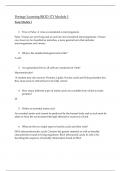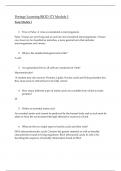Portage Learning BIOD 171 Module 1
Portage Learning
All 3 results
Sort by

-
Portage Learning BIOD 171 Module 1
- Exam (elaborations) • 7 pages • 2024
-
- $3.09
- + learn more
Portage Learning BIOD 171 Module 1 Exam Module 1 1. True or False: A virus is considered a microorganism. False. Viruses are not living and as such are not considered microorganisms. Viruses can, however, be classified as microbes, a more general term that includes microorganisms and viruses. 2. What is the smallest biological unit of life? A cell. 3. At a generalized level, all cells are comprised of what? Macromolecules* *A student may also answer: Proteins, Lipids, Nucleic acids ...

-
Portage Learning BIOD 171 Module 1
- Exam (elaborations) • 7 pages • 2024
-
- $12.49
- + learn more
Portage Learning BIOD 171 Module 1 Exam Module 1 1. True or False: A virus is considered a microorganism. False. Viruses are not living and as such are not considered microorganisms. Viruses can, however, be classified as microbes, a more general term that includes microorganisms and viruses. 2. What is the smallest biological unit of life? A cell. 3. At a generalized level, all cells are comprised of what? Macromolecules* *A student may also answer: Proteins, Lipids, Nucleic acids ...

-
Portage Learning BIOD 171 Module 1Exam Module 1
- Exam (elaborations) • 8 pages • 2022
-
- $13.49
- + learn more
Portage Learning BIOD 171 Module 1 Exam Module 1 1. True or False: A virus is considered a microorganism. False. Viruses are not living and as such are not considered microorganisms. Viruses can, however, be classified as microbes, a more general term that includes microorganisms and viruses. 2. What is the smallest biological unit of life? A cell. 3. At a generalized level, all cells are comprised of what? Macromolecules* *A student may also answer: Proteins, Lipids, Nucleic acid...

How did he do that? By selling his study resources on Stuvia. Try it yourself! Discover all about earning on Stuvia


